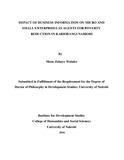| dc.description.abstract | This study investigates the role business information plays in the performance and poverty reduction of micro and small entrepreneurs in Kariobangi. The study considers micro and small entrepreneurs in Kariobangi, Nairobi, as agents of poverty reduction. The study has used International Labour Organization (ILO, 2002) definition of micro and small enterprises as “those economic entities that are characterized by ease of access; dependence on native resources; family possession; small scale of operation; use of adapted technology and skills obtained outside the conventional educational system; and not moderated and competitive markets” (ILO, 2002). The micro and small entrepreneurs in Kariobangi operate in business environments that have limited relevant business information on credit, business location, customers, price, markets, technology, government policy and regulations, and support services. This situation motivated this survey to investigate the potential influence of business information on micro and small entrepreneurs as agents for poverty reduction. It has done this by examining how the use of different types of business information, networks, preferred media and other demographics influence poverty reduction.
Mugande (2003)” the study uses both quantitative and qualitative research methodologies. Due to the absence of an official list of micro and small entrepreneurs in the study area”, the researcher constructed own sample population using a list of 1436 enterprises supported by some churches in Kariobangi as a baseline. A simple random sample of 144 entrepreneurs, proportionately drawn from the four clusters in the study area, was selected for the survey. Research assistants, who were mainly young people from Kariobangi, were recruited and trained to pre-test and administer the structured questionnaires under the supervision of the researcher. The survey was followed by detailed case studies of ten entrepreneurs purposively selected using a matrix of variables from the poverty category. The filled questionnaires were cleaned, coded and then entered into a computer database. “Analysis of quantitative data using the Statistical Package for Social Sciences proceeded in stages, starting with the generation of descriptive statistics of some of the variables” (Mugande 2003). Further tests of correlation between dependent and independent variables were also done. Qualitative data from in-depth interviews of the cases were content analysed.
The study has found that access and use of business information enabled micro and small entrepreneurs to graduate out of the poverty category. In particular, entrepreneurs who accessed and used different types of business information, networks, preferred media and demographics shared information were able to perform well and exit from poverty. Besides recording improved income, this category of entrepreneurs were able to access better health care, housing, safe water and education for their household. Notably, the main sources of business information were the family unit, friends, relatives and co-workers operating through cultural, economic, religious and ethnic orientations. The study concluded, from an entrepreneurial perspective, that continued use of different types of business information, networking with others, use of preferred media and the demographics shared information, make micro and small entrepreneurs potential growth engines that the government could use to reduce poverty. The study recommends that the levels at which business information dissemination occur in and through micro and small entrepreneurs, require a targeted approach in order to achieve positive results. This study has therefore provided empirical evidence that associates business information with poverty reduction. | en_US |



